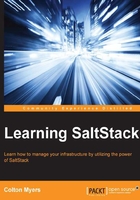
Introducing Salt
Before installing Salt, we should learn the basic architecture of a Salt deployment.
The two main pieces of Salt are the Salt Master and the Salt Minion. The master is the central hub. All minions connect to the master to receive instructions. From the master, you can run commands and apply configuration across hundreds or thousands of minions in seconds.
The minion, as mentioned before, connects to the master and treats the master as the source of all truth. Although minions can exist without a master, the full power of Salt is realized when you have minions and the master working together.
Salt is built on two major concepts: remote execution and configuration management. In the remote execution system, Salt leverages Python to accomplish complex tasks with single-function calls. The configuration management system in Salt, called States, builds upon the remote execution foundation to create repeatable, enforceable configuration for the minions.
With this bird's-eye view in mind, let's get Salt installed so that we can start learning how to use it to make managing our infrastructure easier!